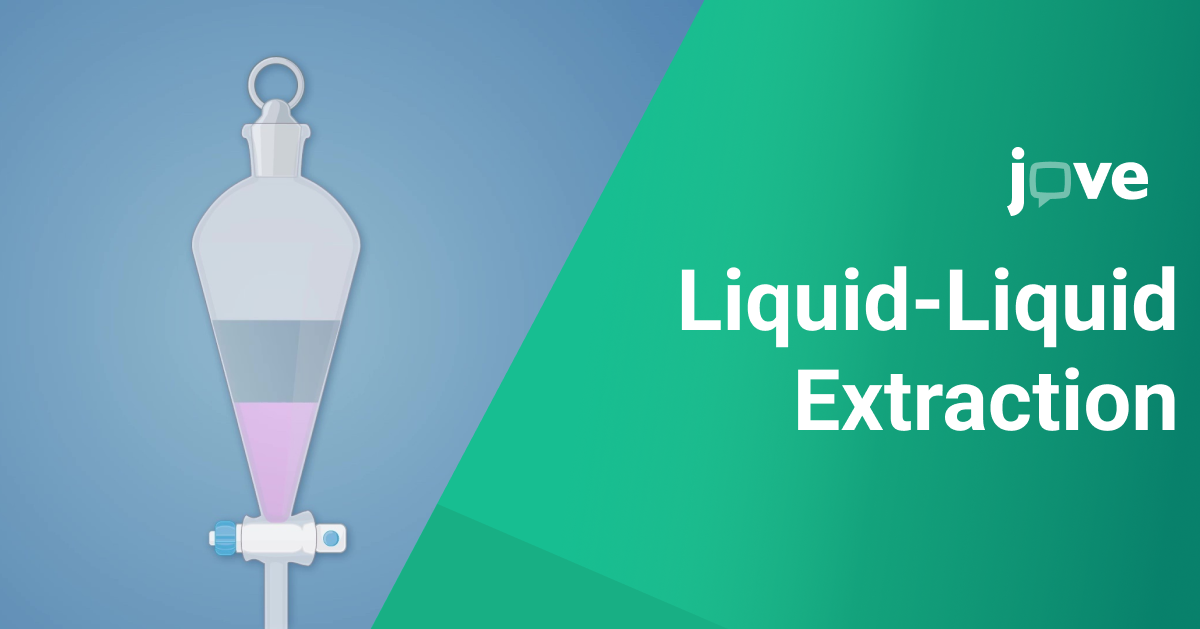In this blog post, we will delve into the essential technique of liquid-liquid extraction, a crucial method in organic chemistry. This process is widely used for separating and purifying components of mixtures based on their solubility in different immiscible liquids. For a deeper understanding and visual demonstrations, you can explore the resources available on JoVE.com.
What Liquid-Liquid Extraction is used for?
Liquid-liquid extraction is a fundamental method in organic chemistry, used extensively to separate components of a mixture based on differences in their solubility in two different immiscible liquids. This technique, often termed as solvent extraction, plays a critical role in the purification and isolation of specific substances from complex mixtures.This process is commonly used in organic chemistry labs for extracting compounds from aqueous solutions into organic solvents.
Liquid-Liquid Extraction Procedure
Preparing for Extraction: Before beginning the extraction process, it’s important to choose the right solvents which must be immiscible (not soluble in one another). Commonly used pairs include water and ether, water and dichloromethane, or water and hexane.
Performing the Extraction: The actual extraction process involves shaking a separatory funnel containing the mixture and the two solvents. After shaking, the mixture is allowed to settle into two distinct layers, each containing different components of the original mixture. The lower or upper layer (depending on the density of the solvent) can then be drained off and further processed.
Best Solvents Used for Liquid-Liquid extraction
The choice of solvent in liquid-liquid extraction is critical for the success of the process. Some commonly used solvents include:
- Ether: Often used for extracting organic compounds from aqueous solutions due to its high volatility and ability to dissolve a wide range of organic compounds.
- Chloroform: Effective for extracting compounds that are more soluble in chloroform than in water.
- Ethyl Acetate: Frequently used due to its relatively low toxicity and good solvating properties for many organic compounds.
- Ethanol: Commonly used for extracting compounds from plant materials due to its ability to dissolve both polar and non-polar substances.
- Hexane: Ideal for extracting non-polar compounds such as oils and fats from mixtures.
- Purification and Isolation: Liquid-liquid extraction is crucial for purifying and isolating chemical compounds. This technique can selectively remove impurities or extract valuable compounds from reaction mixtures, which is essential for chemical synthesis and drug development.
- Analytical and Preparative Applications: Beyond purification, liquid-liquid extraction also has broad applications in both analytical and preparative chemistry. It can be used to prepare samples for analysis or to scale up reactions for manufacturing purposes.
Learning More About Liquid-Liquid Extraction with JOVE.com
For those interested in a deeper understanding of liquid-liquid extraction, JOVE.com provides extensive educational content, including detailed videos that demonstrate the extraction process and explain the underlying principles.
Advanced Learning Modules
Subscribing to JOVE’s advanced educational modules can enhance your understanding of not only liquid-liquid extraction but also other essential techniques in organic chemistry. These resources are invaluable for students and researchers aiming to master complex chemical processes.
Conclusion
Liquid-liquid extraction is a versatile and essential technique in organic chemistry that facilitates the effective separation and purification of compounds. Its applications extend from academic laboratories to industrial processes, making it a critical skill for chemists and researchers. Understanding and implementing this method can lead to more efficient laboratory practices and deeper insights into the chemical properties of substances. This guide aims to equip you with the knowledge and skills needed to effectively use liquid-liquid extraction in various chemical contexts.
